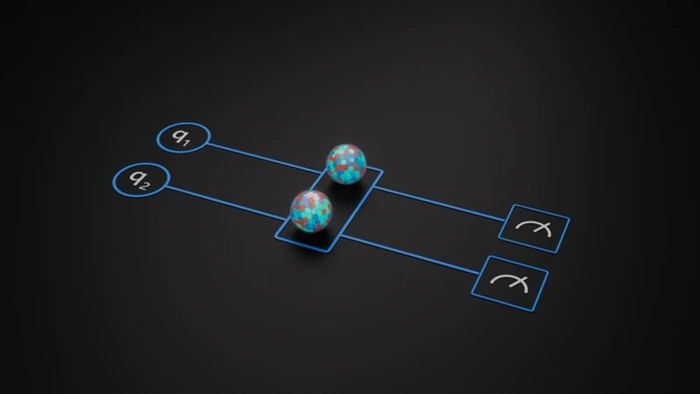A researcher uses a simulator at Harvard, a university that has signed an alliance with Amazon's quantum services. Jon Chase / Harvard
When American physicist Theodore Harold Maiman developed and patented the first laser in 1960, it was greeted by the scientific community as "a solution waiting for a problem."
Only a year later, the problem arrived and it was used to operate on an eye tumor.
Today it is present in all areas, from lightning deflection technologies to telecommunications networks or the military or entertainment industry.
Something similar happens with quantum computing.
It is not yet possible to speak of a robust and fault-tolerant quantum computer, but the commitment to this system is firm and the main companies that develop quantum technology (Google, IBM, Intel, Amazon and Microsoft, among others) offer their services to extend its use, favor the development of applications and technologies and to be there when the market emerges,
that it will be soon, in this decade if the best expectations are met.
Quantum computing already has uses in medical research, pharmacology, industry, finance, chemistry, and physics.
.
It has a team that has signed some of the main advances in this field (Google Quantum Artificial Intelligence) and has developed several versions of Sycamore, a programmable processor that can run physics and chemistry simulation algorithms, as well as applications in generative machine learning. , among other areas.
Google trains specialists to work with these processors and the applications are generated in open source (
open source)
.
“We have developed a simulator, so anyone can go to our website, click on a link and start programming.
All of this, right now, is open source and free to encourage applications to be developed in all countries”, explains Sergio Boixo, a Spanish physicist who is a member of the Google Quantum Artificial Intelligence (AI) research group.
More information
Sergio Boixo: "We are very close to having a quantum computer without errors"
The Google Sycamore processor has been used for the first quantum simulation of a wormhole, published in
Nature
to verify "that the properties of a quantum system match what is expected in a gravitational system," according to Maria Spiropulo, a physicist at the Institute. of California Technology (Caltech).
Also Columbia chemistry professor David Reichman and Joonho Lee, with Google Quantum AI researchers, have used 16 qubits from Sycamore to find the lowest energy state of a molecule (
Nature
)
.
“These are the largest quantum chemistry calculations ever performed on a real device,” Reichman says.
For their part, scientists from the Technical University of Munich (TUM) and the University of Nottingham have simulated states of quantum matter (
Science
)
.
“Quantum processors, in the short term, will represent an ideal platform to explore the physics of matter.
In the near future, they promise to solve problems that are beyond the reach of today's classical supercomputers”, says Frank Pollmann, professor at TUM.
IBM.
The multinational has the IBM Quantum Network so that clients and partners can access the quantum computing of this company, which is already working on the Condor, which will be the first universal processor of more than 1,000 qubits.
Qiskit, IBM's quantum community of open source programs has 1.8 million downloads for developing applications.
"In the Quantum Network there are already more than 200 institutions, from large companies to laboratories, universities and strategic partners around the world," says Darío Gil, vice president of IBM and director of the research division (IBM Research) that develops computing. quantum of this company.
Among them are Boeing, to research new materials, BP for energy efficiency or Daimler for battery development.
More information
Darío Gil, director of IBM Research: "Our vision is that you benefit from the quantum world without knowing anything about it"
Cleveland Clinic and IBM have deployed the first quantum computer in the private medical sector in the United States.
“The current pace of scientific discovery is unacceptably slow, while our research needs are growing exponentially.
We cannot afford to spend a decade or more moving from a research idea in a lab to therapies on the market.
Quantum offers a future to transform this pace, particularly in drug discovery and machine learning," says Lara Jehi, director of Research Information at the medical entity.
Pouyan Ghaemi, a physicist at the City College of New York, has used IBM quantum computers to study and predict how the state of large numbers of interacting quantum particles evolves over time.
“Our quantum computing algorithm opens a new way to study the properties of materials resulting from strong interactions between electrons.
As a result, it can potentially guide the search for useful materials, such as high-temperature superconductors,” explains Ghaemi, who published his research in
Physical Review Letters
.
Guillermo García-Pérez , a physicist at the University of Helsinki, in collaboration with IBM, has published in
PRX Quantum
, a formula
to reduce the number of computations required to read data stored in the state of a quantum processor.
“We make the most of each sample by combining all the data produced.
At the same time, we adjust the measurement to produce highly accurate estimates.
Putting these ingredients together, we can decrease the expected execution time by several orders of magnitude”, explains García-Pérez.
Intel
.
After launching its beta version in September 2022, Intel Quantum released version 1.0 of the Software Development Kit (SDK) in February, available on the Intel Developer's Cloud.
The SDK, according to the company, is a quantum computer in simulation that can also run hybrid quantum-classical algorithms.
The Intel Quantum Simulator (IQS) is capable of hosting 32 qubits on a single node and more than 40 on multiple nodes.
“The Intel Quantum SDK helps developers prepare for the large-scale commercial quantum computers of the future.
Not only does it help developers learn to build quantum algorithms and applications in simulation, but it also moves the industry forward by creating a community of developers that will accelerate application development,” said Anne Matsuura, director of Quantum Architecture and Applications at Intel. Labs.
The Deggendorf Institute of Technology in Munich has used the SDK to explore fluid dynamics in hydrodynamic and aerodynamic problems.
He also investigates quantum use cases for image denoising and realistic image generation, as well as solving unstructured search problems, machine learning, materials simulation, and astrophysics problems.
“The Intel Quantum SDK is a game changer in quantum development because it allows the developer to operate closer to the
hardware
to better leverage resources,” says Yaknan Gambo, a graduate student at the Deggendorf Institute of Technology.
Intel is working with four other universities to develop curricula and expand the use of quantum computing in academia: Pennsylvania, Keio, Ohio State, and Pennsylvania State.
A NASA JET engineer watches the signal tracking of the DSN network.Microsoft
Microsoft
.
Azure Quantum is Microsoft's cloud quantum computing platform.
NASA's Jet Propulsion Laboratory (JPL) uses NASA's quantum technology to explore ways to communicate more efficiently with spacecraft through the Deep Space Network (DSN), a global network of large radio antennas. located in California, Spain and Australia.
It is also used in the medical field.
“Quantum-inspired optimized algorithms really do solve our tough problems and make MRI faster, cheaper, and more efficient,” explains radiologist Mark Griswold.
And in the industry.
For Patrick Ellis, director of Ford Research, the quantum advantage is that it is able to provide solutions in "problem areas, where the value really is."
Amazon Web Services
.
After 17 years, Amazon Web Services (AWS) has more than 200 complete services for computing, from 99 Availability Zones within 31 geographic regions, including the recently opened AWS Infrastructure Region in Spain with several data centers.
These regions will be joined by Canada, Israel, Malaysia, New Zealand and Thailand.
Four years ago it incorporated Amazon Braket, created to accelerate scientific research and computing.
This is a fully managed service that allows the use of different quantum computers and simulators.
In addition, they have a support team (Amazon Quantum Solutions Lab) and two research centers for computing and networks (AWS Center for Quantum Computing and AWS Center for Quantum Networking).
Harvard University and Amazon Web Services have maintained a strategic alliance for network research and innovation since last September with the aim of developing fundamental methods and technologies for a quantum internet.
"The joint work of the academy and the industry can accelerate the discovery and the technological progress", assures the president of Harvard, Alan M. Garber.
“Harvard has a number of research groups that are dedicated to quantum information issues and, specifically, in the area of quantum networks they have some of the most cutting-edge groups in the United States.
It is a way of collaborating that we find very productive and in three main aspects: research, because there is still a lot to be done, financing of equipment and professional development, training students”, explains Antía Lamas-Linares, head of quantum networks at AWS.
The manufacturer BMW works with AWS to analyze robotic movements in the production plant or the investment banking group Goldman Sachs.
Its services in pharmaceutical research have also been used to optimize clinical trials and reduce their cost.
Also using his services are the French company Pasqal, which has developed the QUBEC program for chemical simulations, and the Italian National Institute for Nuclear Physics (INFN), which is looking for applications in high-energy physics and fundamental physics.
Starting this February, AWS has Lucy, Oxford Quantum Circuits' eight-qubit quantum computer, named after German quantum mechanics pioneer Lucy Mensing.
Spain.
The first quantum computers will be installed at the Barcelona Supercomputing Center - Centro Nacional de Supercomputación (BSC-CNS) as part of the European High Performance Computing Joint Undertaking
(EuroHPC JU) supercomputing consortium
.
In addition, last year, 13 Spanish entities started the CUCO project to investigate the use of quantum computing and its application to five strategic industries: energy, finance, space, defense and logistics.
By next year, IBM will deploy its first Quantum Computational Center in San Sebastián, providing Qiskit Runtime services to the region from a 127-qubit Quantum System One.
Among the private initiatives with more years of use are that of the Spanish bank BBVA, which has analyzed different quantum and traditional technologies to
improve the process of optimizing investment portfolios with market data, as reflected by
Quantum Physics
.
Since 2018, the financial entity has collaborated on quantum projects with companies and entities such as IBM, Fujitsu, Accenture, Zapata and the Higher Center for Scientific Research (CSIC).
IESE Business School, the business school of the University of Navarra, also uses quantum computing in its classrooms to help students solve real business problems.
You can write to us at
rlimon@elpais.es
, follow
EL PAÍS Tecnología
on
and
or sign up here to receive our
weekly newsletter
Subscribe to continue reading
Read without limits
Keep reading
I'm already a subscriber

/cloudfront-eu-central-1.images.arcpublishing.com/prisa/IKB32CXV2BBMDFNB554RPY25YE.webp)







